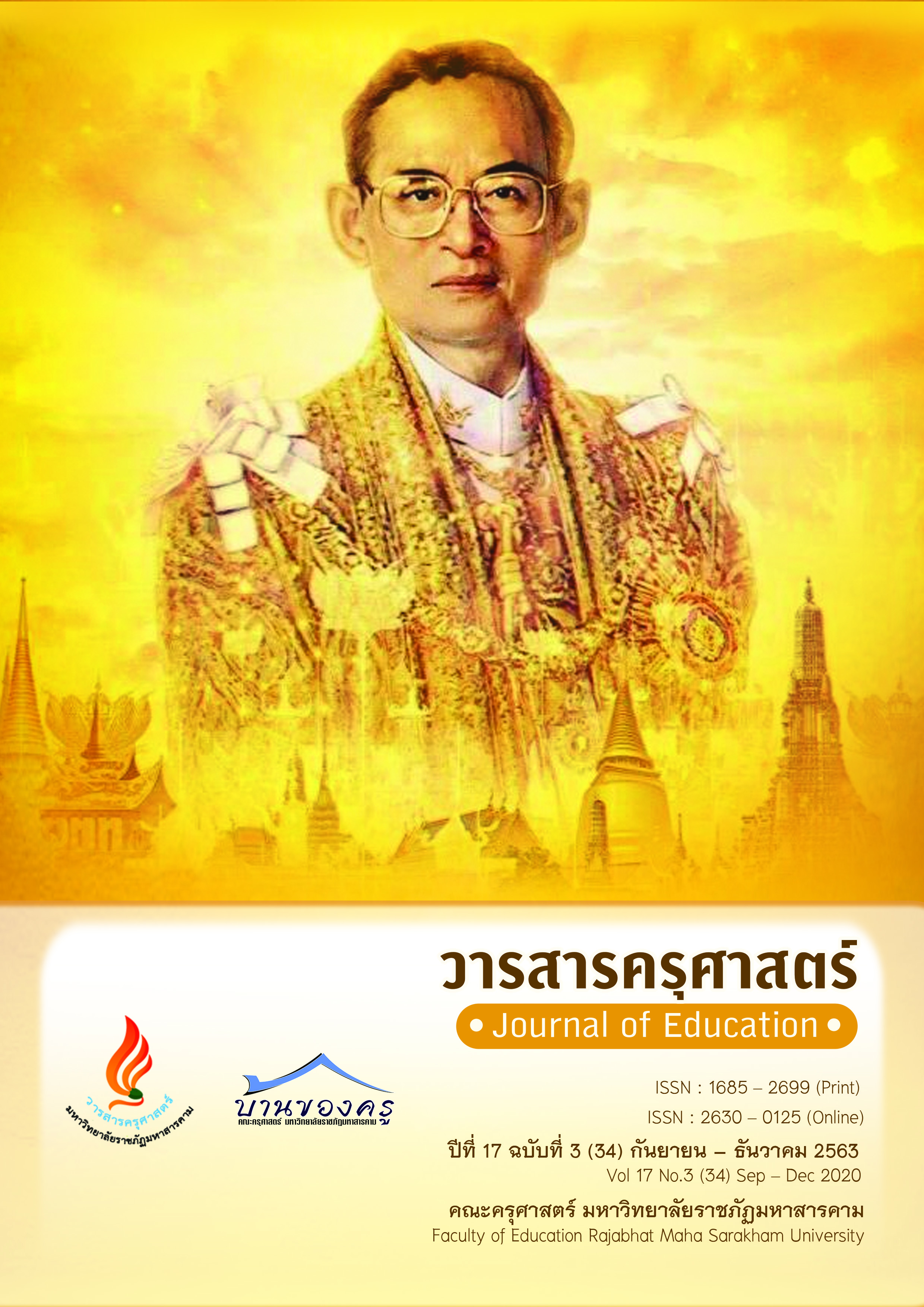The Study of Probabilistic Reasoning Ability of Mathayomsuksa Three Students by Using Hands on Activities and Gamification
Main Article Content
Abstract
The purposes of this research were to study probabilistic reasoning ability and frameworks for
developing Mathayomsuksa three students’ probabilistic reasoning ability by using hands on activities with gamification. The research design was quasi experimental. The targets were 32 Mathayomsuksa three students in Science Mathematics Enrichment Program of Chanpradittharam Witthayakom School in the second semester of the academic year 2019. Research instruments consisted of probability lesson plans by using hands on activities with gamification, hands on materials and probabilistic reasoning ability assessments which all items were examined in content validity by the experts and IOC was more than 0.5. Statistic data analyzed were percentage and content analysis.
The research results revealed that 1) the level of probabilistic reasoning ability of the targets after learning by using hands on activities with gamification was in the highest level (4th level in all aspects as 82.81% and 2) the frameworks for developing Mathayomsuksa three students’ probabilistic reasoning ability by using hands on activities with gamification consisted of three procedures – i.e. warm-ups, practice and presenting results, and expansion. The hands-on activities applied to the real situation and used the elements of gamification to engage and challenge students.
Article Details
ข้อกำหนดเบื้องต้นที่ผู้นิพนธ์(ผู้ส่งบทความ) ควรทราบ
1. ผู้นิพนธ์ที่ประสงค์จะลงตีพิมพ์บทความกับวารสาร ตั้งแต่เดือนมกราคม 2563 เป็นต้นไป ให้ใช้รูปแบบใหม่ (Template 2563) โดยสามารถดูตัวอย่างได้ที่เมนู GUIDELINES
2. จะตีพิมพ์และเผยแพร่ได้ ต้องผ่านการประเมินจากผู้ทรงคุณวุฒิ (Peer Review)
3. การประเมินบทความโดยผู้ทรงคุณวุฒิ (Peer Review) เป็นแบบ Double Blind
4. การอ้างอิงบทความใช้หลักเกณฑ์ APA (American Psychological Association) คลิก
5. บทความถูกปฏิเสธการตีพิมพ์ ไม่ผ่านการประเมิน ผู้นิพนธ์ขอยกเลิกเองหรือชำระเงินก่อนได้รับการอนุมัติ ทางวารสารไม่มีนโยบายการคืนเงิน
References
กฤษณพงศ์ เลิศบำรุงชัย. (2560). เกมมิฟิเคชัน (Gamification) โลกแห่งการเรียนรู้ที่ขับเคลื่อนด้วยเกม.สืบค้นจาก http://touchpoint.in.th/gamification/.
จุฑามาศ มีสุข. (2558). การจัดกิจกรรมการเรียนรู้ เพื่อเสริมสร้างพฤติกรรมการมีส่วนร่วมของนักเรียน โดยใช้เทคนิคเกมมิฟิเคชัน สำหรับนักเรียนห้องเรียนพิเศษวิทยาศาสตร์ ชั้นมัธยมศึกษาปีที่ 4 โรงเรียนอนุกูลนารี (วิทยานิพนธ์ปริญญามหาบัณฑิต). มหาวิทยาลัยราชภัฏมหาสารคาม, มหาสารคาม.
ภัทรพล เมฆอากาศ. (2554). การใช้กิจกรรมปฏิบัติเพื่อพัฒนาการให้เหตุผลเชิงความน่าจะเป็นของนักเรียนชั้นมัธยมศึกษาปีที่ 3 โรงเรียนพัฒนาประชาอุปถัมภ์ จังหวัดแพร่ (วิทยานิพนธ์ปริญญามหาบัณฑิต). มหาวิทยาลัยเชียงใหม่, เชียงใหม่.
ศุภกร ถิรมงคลจิต. (2558). ผลของการจัดกิจกรรมการเรียนรู้วิชาวิทยาศาสตร์ตามแนวคิดเกมมิฟิเคชัน เพื่อส่งเสริมแรงจูงใจในการเรียนของนักเรียนชั้นประถมศึกษาปีที่ 2 (วิทยานิพนธ์ปริญญามหาบัณฑิต). จุฬาลงกรณ์มหาวิทยาลัย, กรุงเทพมหานคร.
สถาบันทดสอบทางการศึกษาแห่งชาติ (องค์การมหาชน). (2562). สรุปผลการทดสอบทางการศึกษาระดับชาติขั้นพื้นฐาน (O-NET) ชั้นมัธยมศึกษาปีที่ 6 ปีการศึกษา 2561. สืบค้นจาก http://newonetresult.niets.or.th/AnnouncementWeb/School/ReportSchoolBySchool.aspx?mi=.
สถาบันส่งเสริมการสอนวิทยาศาสตร์และเทคโนโลยี. (2560). รายงานผลการวิจัยโครงการ TIMSS 2015 ชั้นมัธยมศึกษาปีที่ 2. สืบค้นจาก http://timssthailand.ipst.ac.th/timss/Report/timss2015report.
สำนักงานเลขาธิการสภาการศึกษา. (2550). แนวทางการจัดการเรียนรู้ที่เน้นผู้เรียนเป็นสำคัญการจัดการเรียนรู้แบบประสบการณ์และเน้นการปฏิบัติ. กรุงเทพฯ: ชุมนุมสหกรณ์การเกษตรแห่งประเทศไทย.
สิริพร ทิพย์คง. (2545). หลักสูตรและการสอนคณิตศาสตร์. กรุงเทพมหานคร: บริษัทพัฒนาคุณภาพวิชาการ.
อัมพร ม้าคนอง. (2553). ทักษะและกระบวนการทางคณิตศาสตร์: การพัฒนาเพื่อพัฒนาการ.กรุงเทพมหานคร: จุฬาลงกรณ์มหาวิทยาลัย.
Jones, G. A., Thornton, C. A., Langrall, C. W., & Tarr, J. E. (1999). Understanding students’ probabilistic reasoning. Reston, VA: National Council of Teachers of Mathematics.
Kapp, K. M. (2012). The Gamification of learning and instruction: Game-based methods and strategies for training and education. San Francisco, CA: Pfeiffer.
Lawson, A. E. (2000). What kind of scientific concept exist? Concept construction and intellectual development in college biology. Journal of Research in Science Teaching, 9, 996-1018
National Council of Teachers of Mathematics. (2000). Principles and Standards for School Mathematics. Reston, VA: National Council of Teachers of Mathematics.
Nina, H. 2009. Hands-on Activities and Their Influence on Students’ Interest. Retrieved from https://link.springer.com/content/pdf/10.1007/s11165-009-9142-0.pdf.
Robson, K., Plangger, K., Kietzmann, J. H., McCarthy, I., & Pitt, L. (2015). Is it all a game? Understanding the principles of gamification. Business Horizons, 58(4), 411-420.
doi: http://dx.doi.org/10.1016/j.bushor.2015.03.006


